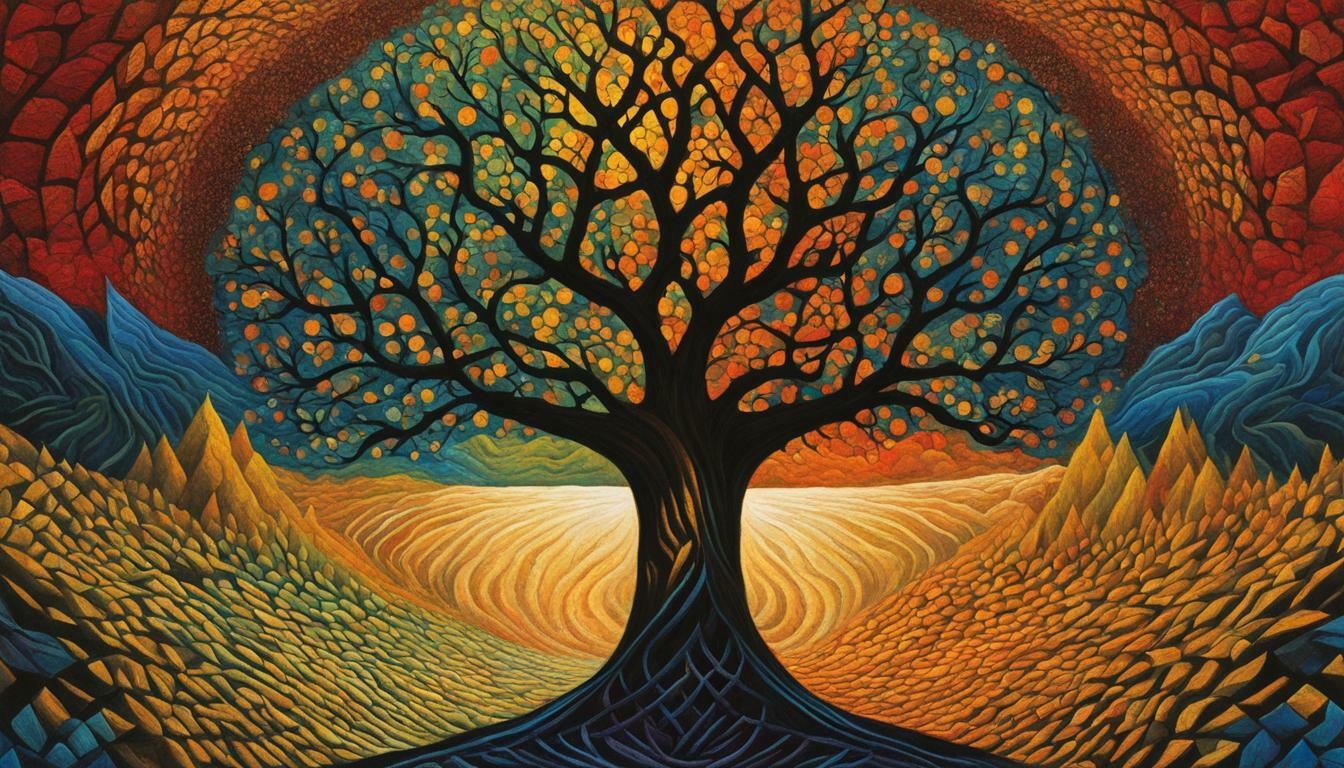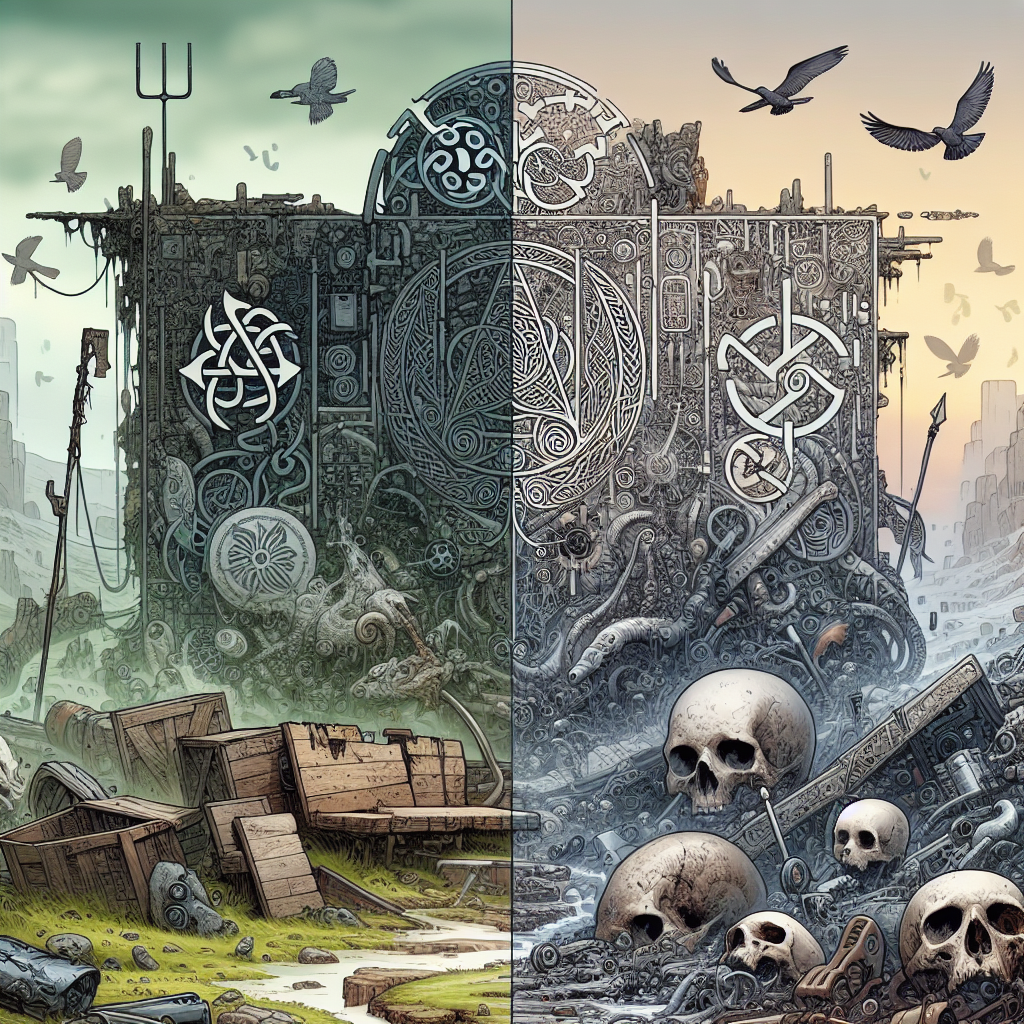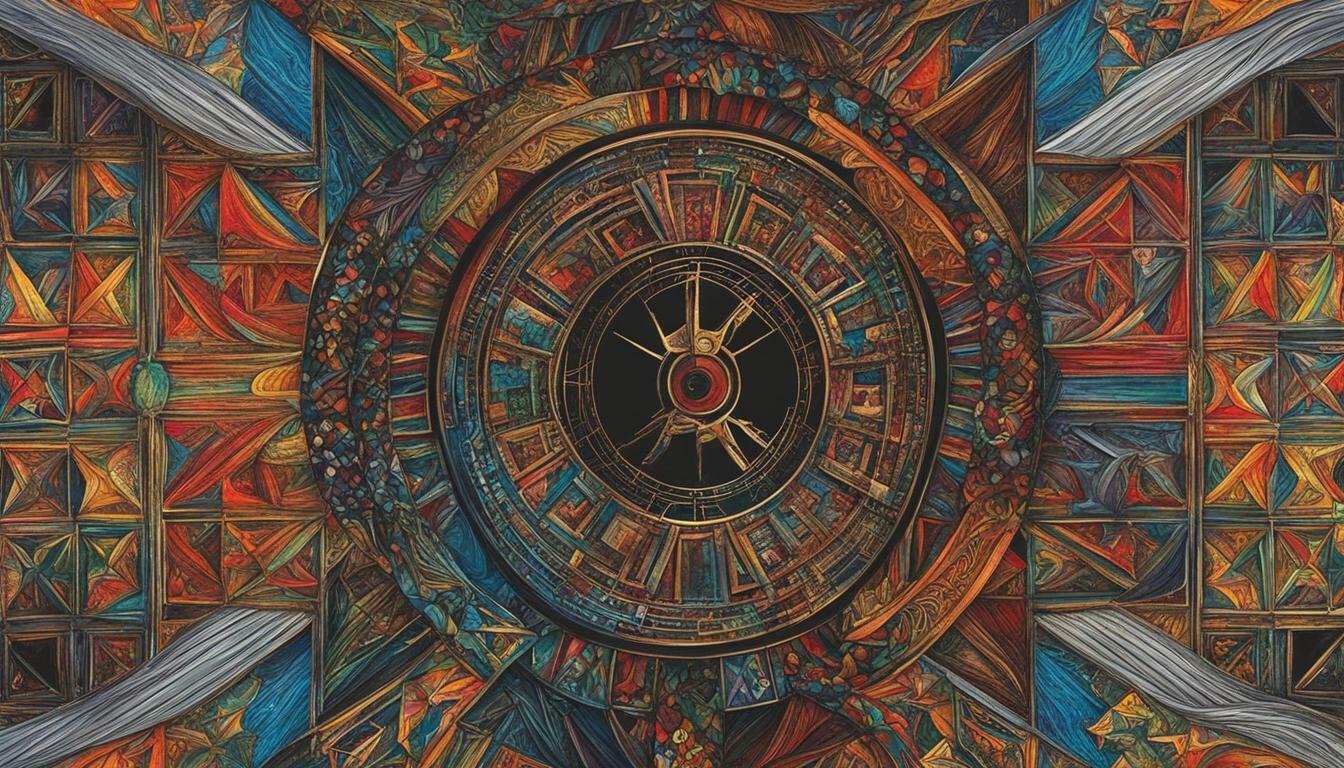The soul’s journey in Gnosticism and Kabbalah offers unique spiritual perspectives that differ in their views on the divine spark within humans and the ultimate goal of redemption. In Gnosticism, the divine spark is seen as entrapped in an evil realm, and the soul’s journey involves freeing itself from this realm and returning to its divine home. Gnostic knowledge is obtained through spiritual regeneration and an awakening of the inner self. On the other hand, Kabbalah views the soul’s journey as an ethical, political, and psychological event that requires conformity to divine commandments, the return of Jewish exiles to Israel, and the discovery of the roots of one’s own soul. Redemption in Kabbalah is not solely an inner process but also involves the restoration and repair of the world. Additionally, while Gnosticism sees the world as a place of evil and seeks to escape it, Kabbalah sees the world as a mixture of good and evil and aims to elevate and sanctify it. This difference in perspective leads to a different view of humanity and the world in Gnosticism and Kabbalah. Jungian psychology, often considered Gnostic in nature, actually aligns more with the Kabbalistic view. Overall, while both Gnosticism and Kabbalah involve the awakening and reunion of the divine spark in the soul, their perspectives on the nature of the world and the role of humanity in redemption differ significantly.
Key Takeaways:
- Gnosticism and Kabbalah offer distinct perspectives on the soul’s journey and redemption.
- In Gnosticism, the soul is entrapped in an evil realm and seeks to free itself and return to its divine home.
- Kabbalah views the soul’s journey as an ethical, political, and psychological process that involves conformity to divine commandments and the restoration of the world.
- Gnosticism regards the world as inherently evil, while Kabbalah sees it as a mixture of good and evil to be elevated and sanctified.
- Jungian psychology aligns more with the Kabbalistic view of the soul’s journey and redemption.
Gnostic Views on the Soul’s Journey
Gnosticism views the soul’s journey as a path of freeing itself from an evil realm and returning to its divine home through spiritual evolution and esoteric teachings. According to Gnostic beliefs, the divine spark within humans is trapped in a material world created by a flawed deity, known as the demiurge. This material world is seen as a place of ignorance, suffering, and spiritual enslavement.
The soul’s ascent in Gnostic traditions involves a process of awakening and liberation from this entrapment, with the ultimate goal being the reunion with the divine. Spiritual evolution is seen as the key to unlocking the hidden knowledge and wisdom within oneself, allowing the soul to transcend the limitations of the physical realm.
Gnostic Teachings on Spiritual Evolution
Gnosticism emphasizes the importance of knowledge and self-awareness in the soul’s journey. The acquisition of gnosis, or divine knowledge, is seen as a transformative experience that leads to the awakening of the inner self and the recognition of one’s divine nature. Through esoteric teachings and practices, Gnostics seek to remove the veils of ignorance and illusion that separate them from their true spiritual essence.
“The path of the soul’s journey in Gnosticism is one of illumination and self-discovery. It is a quest to uncover the divine spark within oneself and reunite with the divine source.” – Gnostic Teacher
Soul’s Ascent and Union with the Divine
In Gnostic traditions, the soul’s ascent is viewed as a gradual process of purification and transformation. It involves overcoming the influences of the material world and the false reality created by the demiurge. Through spiritual practices, such as meditation, prayer, and introspection, the soul seeks to rise above the limitations of the physical realm and reunite with the divine.
This journey towards union with the divine is not only an individual endeavor but also a collective one. Gnosticism teaches that all souls are connected and that the liberation of one soul contributes to the liberation of all. The ultimate goal is the reunification of all divine sparks, the restoration of wholeness, and the return to the divine realm.
| Gnostic Views on the Soul’s Journey | |
|---|---|
| Spiritual Evolution | The soul’s journey involves spiritual evolution and the acquisition of divine knowledge through esoteric teachings. |
| Soul’s Ascent | The soul seeks to ascend above the limitations of the material world and reunite with the divine. |
| Collective Liberation | The liberation of one soul contributes to the liberation of all, aiming for the reunification of all divine sparks. |
Kabbalistic Perspectives on the Soul’s Journey
Kabbalah offers a different perspective on the soul’s journey, emphasizing ethical, political, and psychological aspects, as well as mystical beliefs about the journey and its view of humanity and the world. In Kabbalistic teachings, the soul’s journey is seen as a transformative process that involves adhering to divine commandments, returning Jewish exiles to their homeland, and uncovering the roots of one’s own soul. This emphasis on ethical conduct highlights the importance of living in accordance with divine principles, with the ultimate goal being the restoration and repair of the world.
One of the mystical beliefs surrounding the soul’s journey in Kabbalah is the idea that each individual has a unique spark of divinity within them. By discovering and nurturing this spark, individuals can contribute to the larger process of redemption and the elevation of the world. Kabbalah also views the world as a mixture of good and evil, with the potential for sanctification and elevation. This perspective differs from Gnosticism, which sees the world as inherently evil and seeks to escape it.
The Kabbalistic view of humanity and the world is rooted in the belief that human actions have a significant impact on the process of redemption. Through observing divine commandments and striving for ethical behavior, individuals can actively participate in the restoration of the world. This contrasts with the Gnostic perspective, which places greater emphasis on the internal spiritual journey and the awakening of the divine spark within.
| Kabbalistic Perspectives on the Soul’s Journey | Gnostic Views on the Soul’s Journey |
|---|---|
| Ethical, political, and psychological aspects | Emphasis on spiritual regeneration and inner awakening |
| Belief in divine commandments and the role of humanity in restoration | Focus on freeing the soul from the entrapment of an evil realm |
| View of the world as a mixture of good and evil | Perception of the world as inherently evil and seeking escape |
In conclusion, the soul’s journey in Kabbalah offers a unique perspective that emphasizes ethical, political, and psychological aspects as well as mystical beliefs about the journey and its impact on humanity and the world. While both Gnosticism and Kabbalah involve the awakening and reunion of the divine spark within the soul, their divergent views on the nature of the world and the role of humanity in redemption set them apart. Understanding these differences can provide a deeper insight into the spiritual philosophies and practices of these ancient traditions.
Comparison: Gnosticism vs Kabbalah Soul’s Journey
By comparing Gnosticism and Kabbalah, we can identify the distinctions between the soul’s journey in these two philosophies. In Gnosticism, the soul’s journey is characterized by its entrapped divine spark in an evil realm. It is a process of liberation and returning to its divine home. Gnostics believe that spiritual knowledge and awakening the inner self are crucial for this journey. This esoteric wisdom, obtained through spiritual regeneration, enables the soul to transcend the material world and reunite with the divine.
On the other hand, Kabbalah offers a different perspective on the soul’s journey. It sees it as a multifaceted event that encompasses ethical, political, and psychological dimensions. Kabbalistic teachings emphasize the importance of conforming to divine commandments and laws as a means of participating in the soul’s journey. Additionally, Kabbalah highlights the significance of the return of Jewish exiles to Israel and the discovery of one’s own soul roots as essential aspects of this journey. Redemption in Kabbalah involves not only the inner transformation of the individual but also the restoration and repair of the world.
These different perspectives on the soul’s journey in Gnosticism and Kabbalah result in disparate views on the nature of the world and the role of humanity in the process of redemption. Gnosticism perceives the world as inherently evil and seeks to escape its influence. In contrast, Kabbalah regards the world as a mixture of good and evil and aims to elevate and sanctify it. This distinction manifests in their respective approaches to the role of humanity in the soul’s journey. While Gnosticism emphasizes individual spiritual awakening, Kabbalah underscores the collective responsibility of humanity towards the process of redemption.
| Gnosticism | Kabbalah |
|---|---|
| Views world as evil realm to escape | Regards world as a mixture of good and evil to elevate and sanctify |
| Focuses on spiritual regeneration and inner awakening | Highlights the importance of divine commandments and return to Jewish roots |
| Emphasizes individual spiritual journey | Stresses collective responsibility of humanity in the soul’s journey |
Redemption and the Role of Humanity
The concept of redemption and the role of humanity differ between Gnosticism and Kabbalah, reflecting their distinct views on the nature of the world and the spiritual journey. In Gnosticism, the world is perceived as a place of evil and suffering, and the goal of redemption is to escape this realm and return to the divine home. The soul’s journey in Gnosticism involves freeing itself from the entrapment of the physical world and ascending to the realm of light and truth. The individual’s actions and choices play a crucial role in this process, as they contribute to the restoration and purification of the soul.
In contrast, Kabbalah sees the world as a combination of good and evil, where redemption is not solely an inner process but also involves the restoration and repair of the physical world. According to Kabbalistic teachings, humanity has a vital role in this process. The return of Jewish exiles to Israel, the adherence to divine commandments, and the exploration of one’s own soul are all part of the journey towards redemption. Kabbalah emphasizes the importance of ethical behavior, social responsibility, and the elevation of the material world through spiritual practices.
“In Gnosticism, the focus is on the liberation of the individual soul, while in Kabbalah, it extends to the collective redemption of humanity and the world,” says Dr. Rachel Cohen, a renowned scholar of comparative religions. “While both traditions share the aim of reuniting the divine spark within the soul, their differing perspectives on the nature of the world shape their understanding of the role of humanity in redemption.”
| Gnosticism | Kabbalah |
|---|---|
| Views the world as a place of evil to be escaped | Sees the world as a mixture of good and evil to be elevated and sanctified |
| Focuses on individual liberation of the soul | Emphasizes collective redemption of humanity and the world |
| Seeks inner transformation and spiritual regeneration | Emphasizes adherence to divine commandments and ethical behavior |
Overall, while Gnosticism and Kabbalah share a common goal of awakening the divine spark within the soul, their perspectives on the nature of the world and the role of humanity in redemption differ significantly. Both traditions offer unique and profound insights into the spiritual journey, inviting individuals to explore and discover their own path towards divine unity and enlightenment.
Jungian Psychology and its Alignment with Kabbalistic View
Jungian psychology, often associated with Gnostic principles, actually aligns more closely with the Kabbalistic view of the soul’s journey. Both Jungian psychology and Kabbalah emphasize the importance of inner transformation and self-discovery in the pursuit of spiritual growth. They share common ground in their recognition of the divine spark or the “God-image” within individuals. According to Jung, the process of individuation involves the integration of the conscious and unconscious aspects of the psyche, leading to a harmonious and authentic sense of self. Similarly, Kabbalah teaches that understanding and connecting with the divine essence within oneself is the key to spiritual enlightenment.
Both Jungian psychology and Kabbalah also recognize the transformative power of symbols and archetypes. Jungian analytical psychology explores the collective unconscious, a vast reservoir of archetypes and universal symbols that shape human thoughts, feelings, and behaviors. Kabbalah, with its rich symbolic language and mystical teachings, utilizes symbols and metaphors to depict the divine realms and the soul’s journey through them. Both systems acknowledge the significance of inner exploration and interpretation of symbols for personal growth and spiritual development.
Furthermore, both Jungian psychology and Kabbalah stress the interconnectedness of all things. Jung’s concept of the collective unconscious suggests a shared psychic heritage among individuals, reflecting the interconnectedness of the human experience. Kabbalah, on the other hand, teaches that all creation is interconnected and that each individual’s actions have the potential to influence the collective reality. Both perspectives highlight the interplay between individual and collective consciousness, underscoring the importance of personal responsibility and the understanding that every thought and action has consequences.
In summary, while Gnosticism and Kabbalah diverge in their perspectives on the soul’s journey, Jungian psychology finds common ground with the Kabbalistic view. Both systems emphasize the process of self-discovery, the recognition of the divine spark within, the power of symbols and archetypes, and the interconnectedness of all things. By aligning with the Kabbalistic view, Jungian psychology offers valuable insights into the soul’s journey and the quest for spiritual transformation.
| Jungian Psychology | Kabbalistic View |
|---|---|
| Emphasizes inner transformation and self-discovery | Recognizes the importance of connecting with the divine essence within oneself |
| Explores the collective unconscious and universal symbols | Utilizes symbols and metaphors to depict the divine realms and the soul’s journey |
| Recognizes the interconnectedness of the human experience | Teaches the interconnectedness of all creation and the influence of individual actions on the collective reality |
Conclusion
The soul’s journey in Gnosticism and Kabbalah offers distinct perspectives, with Gnosticism focusing on liberation from an evil realm and Kabbalah emphasizing ethical, political, and mystical aspects, ultimately leading to a different view of humanity and the world.
In Gnosticism, the soul’s journey centers around the belief that the divine spark within humans is trapped in an evil realm. The goal is to free oneself from this realm through spiritual regeneration and an awakening of the inner self. Gnostic knowledge is obtained through this process of liberation, leading to a reunion with the divine and a return to the original divine home.
Kabbalah, on the other hand, sees the soul’s journey as a multifaceted event that encompasses ethics, politics, and psychology. It emphasizes the importance of conformity to divine commandments, the return of Jewish exiles to Israel, and the discovery of the roots of one’s own soul. In Kabbalah, redemption is not solely an inner process, but also involves the restoration and repair of the world. The goal is to elevate and sanctify the world, viewing it as a mixture of good and evil.
This fundamental difference in perspective gives rise to contrasting views on humanity and the world in Gnosticism and Kabbalah. Gnosticism sees the world as a place of evil to be escaped, while Kabbalah sees the world as a realm to be elevated and sanctified. Consequently, the role of humanity in the soul’s journey also differs. Gnosticism emphasizes the individual’s journey of liberation, while Kabbalah highlights the collective responsibility of humanity in restoring and repairing the world.
Interestingly, Jungian psychology, often considered Gnostic in nature, aligns more closely with the Kabbalistic view. The concepts of the soul’s journey and the transformation of consciousness explored by Jung resonate with the ethical, political, and mystical aspects of Kabbalah. This alignment further showcases the diverse influences and interpretations of these ancient philosophies.
In conclusion, while Gnosticism and Kabbalah both involve the awakening and reunion of the divine spark in the soul, their perspectives on the nature of the world and the role of humanity in redemption differ significantly. Exploring these differences not only sheds light on these ancient traditions but also invites us to reflect on our own spiritual journey and the diverse paths available to us in the pursuit of higher consciousness.
FAQ
What is the difference between the soul’s journey in Gnosticism and Kabbalah?
The difference lies in their perspectives on the divine spark within humans and the ultimate goal of redemption.
How does Gnosticism view the soul’s journey?
Gnosticism sees the divine spark as entrapped in an evil realm and the soul’s journey involves freeing itself from this realm and returning to its divine home.
How does Kabbalah view the soul’s journey?
Kabbalah views the soul’s journey as an ethical, political, and psychological event that requires conformity to divine commandments, the return of Jewish exiles to Israel, and the discovery of the roots of one’s own soul.
What is the goal of redemption in Gnosticism?
In Gnosticism, redemption is an inner process involving spiritual regeneration and an awakening of the inner self.
What is the goal of redemption in Kabbalah?
In Kabbalah, redemption involves the restoration and repair of the world, as well as the elevation and sanctification of the mixture of good and evil within it.
How does humanity play a role in redemption according to Gnosticism?
Gnosticism sees the world as a place of evil to be escaped, and human actions contribute to the process of redemption by freeing the divine spark from its entrapment.
How does humanity play a role in redemption according to Kabbalah?
Kabbalah views humanity as having a role in the soul’s journey through conformity to divine commandments and contributing to the restoration and elevation of the world through ethical actions.
 Skip to main content
Skip to main content


